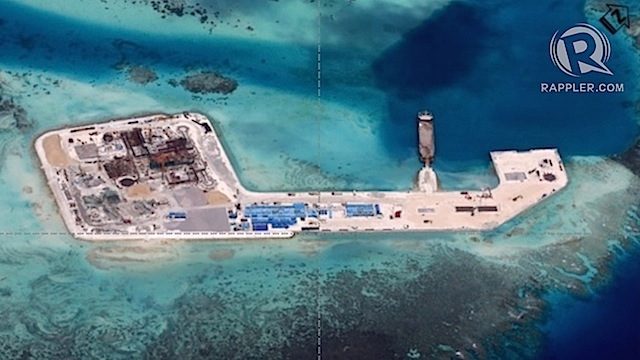SUMMARY
This is AI generated summarization, which may have errors. For context, always refer to the full article.

MANILA, Philippines – The Philippines on Monday, April 13, slammed China for building artificial islands that have destroyed 300 acres of coral reefs in the disputed South China Sea – more than twice the size of Rizal Park.
In a statement Monday, the Philippines’ Department of Foreign Affairs (DFA) cited this figure as it called on China to stop these reclamation activities in the disputed waters, parts of which the Philippines calls the West Philippine Sea.
The DFA said: “China’s massive reclamation activities are causing irreversible and widespread damage to the biodiversity and ecological balance of the South China Sea/West Philippine Sea. We cannot accept China’s claim that its activities have not caused damage to the ecological environment of the South China Sea.” (READ: Philippines to UN: China reclamation destroys nature)
“China has pursued these activities unilaterally, disregarding peoples in the surrounding states who have depended on the sea for their livelihood for generations. The destruction of 300 acres of coral reef systems resulting from the reclamations is estimated to lead to economic losses to coastal states valued at US$100 million annually,” it added.
The figure cited by the DFA – 300 acres, or 121.4 hectares – is more than twice the size of Rizal Park, the main park in the Philippine capital Manila, which is 140 acres (58 ha) big.
It is also almost thrice the size of the 108.5-acre (43.9 ha) Vatican City, the city-state that serves as the headquarters of the Catholic Church, and nearly thrice the size of the 104-acre (42 ha) SM Mall of Asia in Pasay City, one of the largest malls in the world.
The amount of the estimated economic losses – US$100 million – is equivalent to P4.45 billion.
That is enough money, daily, to pay 9.62 million minimum wage earners in the Philippine capital.
The DFA based these figures on a study by the United Nations Environment Program.
The DFA said that aside from from conducting reclamation activities, China “has tolerated environmentally harmful fishing practices by its nationals at Bajo de Masinloc,” which is also known as the Panatag Shoal or Scarborough Shoal.
By doing this, the DFA said, China “breaches its obligations under the 1982 United Nations Convention on the Law of the Sea (UNCLOS), the Convention on Biological Diversity, and the Convention on International Trade in Endangered Species of Wild Fauna and Flora (CITES).”
‘Respect letter, spirit’ of sea code
“We call on China to stop the reclamation activities and to be mindful of its responsibilities as a claimant state and an important member of the international community,” the DFA said. (READ: PH mulls citing China reclamation in historic case)
It also said China should “respect the letter and spirit of the 2002 ASEAN-China Declaration on the Conduct of Parties in the South China Sea,” a landmark statement that aims to prevent tension and ensure maritime security in the disputed waters.
Both the Philippines and China signed the DOC.
The DFA also urged China “to cooperate in discussing constructive long-term solutions to the peaceful resolution of disputes in the West Philippine Sea/South China Sea, in accordance with international law.”
In a separate statement on Saturday, April 11, the DFA also cited “growing international concern” over China’s “massive reclamation activities” in the South China Sea.
These comments came after a newly released set of satellite images revealed that China is artificially expanding a reef in disputed waters, presumably to strengthen its territorial claims.
On Thursday, April 9, US President Barack Obama warned that China shouldn’t “elbow aside” smaller countries like the Philippines, which the Asian giant is in conflict with in the South China Sea. – with reports from Agence France-Presse/Rappler.com
Add a comment
How does this make you feel?
There are no comments yet. Add your comment to start the conversation.